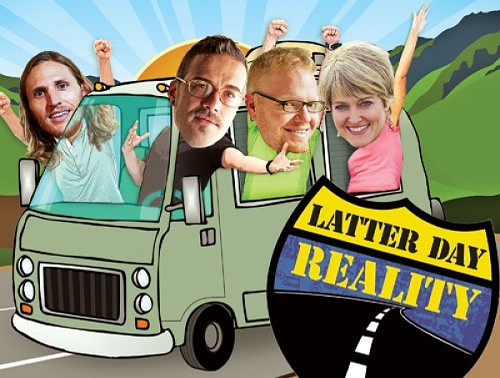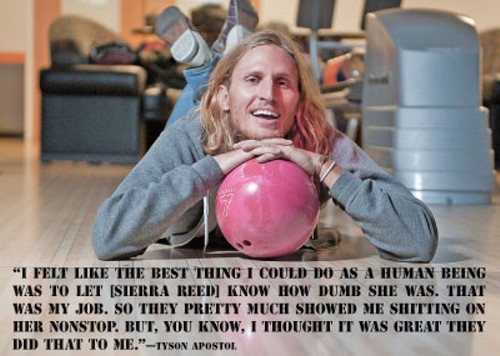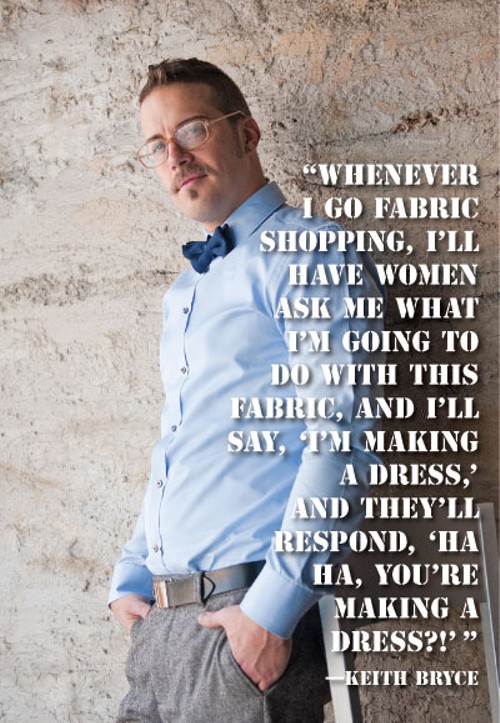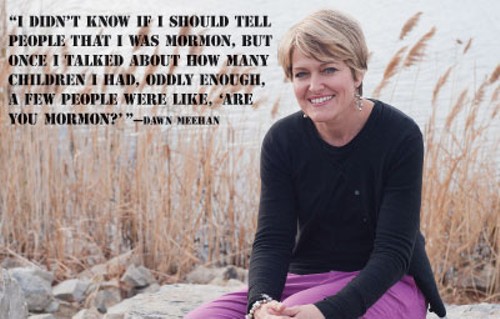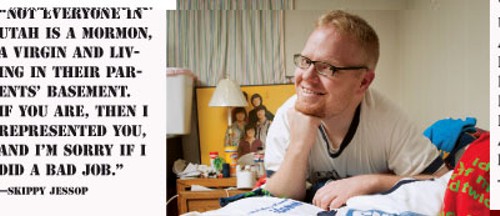Dammit. I was almost on a reality show.
A few years ago, when I was working at a newspaper in Mammoth Lakes, Calif., my co-workers and I were approached by a group of Hollywood producers to do a reality show. The concept was simple: Show how a small ski-town paper grinds for content on a weekly basis while the employees balance their somewhat dysfunctional personal lives. I was all for it.
Being the youngest writer in the office, I felt like I had to fulfill the stereotype of the wild party guy. So, during the phone interviews, I’d say whatever I felt they wanted to hear. “Yeah, I’m sort of a jerk, but I have a heart of gold, you know?”
The studio was called Go Go Lucky Entertainment, makers of such fine reality television as Laguna Beach, Rollergirls and, my personal favorite, Hot Girls in Scary Places. Unfortunately, after a lengthy interview process, the idea fizzled.
We weren’t told why the show never came to fruition. But I believe it never panned out because we simply weren’t that interesting and—more importantly—none of us truly fit a decent reality-show stereotype.
It pains me to say this, but any reality show worth its salt has a firm handle on stereotypes. You know: the token gay guy, the oblivious sorority girl and the angry meathead. Oversimplified characters with scenes edited out of context, these stereotypes make the unfamiliar easy to grasp, and also make for decent TV watching.
As members of the viewing public, we know reality TV isn’t real. But that doesn’t stop from saying to ourselves, “Man, everyone from New Jersey is a douchebag!” Reality TV serves up an easy-to-swallow version of what we know nothing about. The Real Housewives of New Jersey and Jersey Shore supposedly represent all there is to know about the Garden State. Shows like Here Comes Honey Boo Boo, Swamp People and Love & Hip Hop: Atlanta reveal what it’s like to be from that “backward” state of Georgia. And as for Californians, well, just throw a dart at the TV guide. So what about Utah?
Over the past few years, it’s become more and more evident that the Beehive State is a dependable source for reality-TV “talent.” Remember when Ryan Benson dropped the most pounds on The Biggest Loser? How about when David Archuleta got second place on American Idol? Hell, Mitt Romney ran for president, and that was easily the best reality show in over a decade. Apparently, being from Utah is a thing, and people love it. The evidence can be seen in shows like Survivor, The Real World, The Bachelor, Project Runway—the list goes on.
It seems any red-blooded American would happily sit down to a show that mentions Mormons, polygamy or BYU students. It’s sooo foreign! I like to imagine there’s some guy in Connecticut watching Sister Wives right now with as much focus as when he viewed the Mars rover landing.
City Weekly’s TV critic, Bill Frost, has long observed the Utah “factor” in reality-show programming. “Utah isn’t necessarily a ‘better’ breeding ground for reality-TV stars; we’re apparently just more desperate for the attention—good, bad or that special circle of Bachelor/Bachelorette shame. That’s probably why Utahns put up with so many losers, since so few have actually ‘won’ anything on these shows,” he says.
While some attain fleeing fame, reality stars aren’t paid handsomely and rarely find fortune—unless they win it all or become so popular that they’re able to negotiate return appearances or second seasons.
“It’s kind of like the Utah Jazz: No ring, but at least we got on the TV box!” Frost says.
Since not every home-grown reality star fits the same mold, we hit up a few familiar Utahns. Tyson Apostol and Dawn Meehan of Survivor, Skippy Jessop of the Virgin Diaries and Keith Bryce of Project Runway break down the ins and outs of being a Utah reality star—and what it’s like when it’s all over.
The Lovable Utah Jerk: Tyson Apostol
To understand Tyson Apostol, you should know that he’s a smoker who smokes just to piss people off.
“I only smoke when I’m in a big crowd of people because it’s the most offensive thing you can do without getting arrested. You can masturbate in public, but you’ll get arrested for that. But if you smoke in public, people are offended, but they can’t do anything about it. I like to go out and take a huge drag and then blow it in someone’s face from the side.”
As you can see, Apostol had no problem filling the role of reality-show antagonist. He’s appeared on both Survivor: Tocantins and Survivor: Heroes & Villains.
When the Provo resident got back from his 27-day stint on Survivor: Tocantins, he knew he was going to be portrayed as the bad guy. This was mostly due to the fact that he couldn’t stand a certain cast member, Sierra Reed. “I felt like the best thing I could do as a human being was to let [Reed] know how dumb she was. That was my job. So they pretty much showed me shitting on her nonstop. But, you know, I thought it was great they did that to me.”
Whatever your feelings are toward Apostol personally, players like him are a necessary evil on reality television. For Survivor, he was the perfect castaway: a BYU dropout and Jack Mormon with a personality that aligns with The Real World’s Puck.
“The Mormons are a loyal and large enough demographic that it’s gonna impact the ratings,” Apostol says. “They usually want a unique back story, and a lot of Mormons have a unique back story because they went on a mission. Then, to get a unique Mormon that’s gonna piss everyone off is also the ticket. I suppose Survivor needs me more than I need them.”
On the finale of Survivor: Tocantins, host Jeff Probst asked Apostol about his reception back in Utah. Apostol responded, “Well, people either loved me or hated me, but people loved or hated Jesus, too, so you have to take it for what it’s worth.”
Not surprisingly, Apostol angered a few Utah viewers. The worst response came from a family friend.
“I got an e-mail from my late grandpa’s colleague that said my grandpa would be so disappointed with how I represented the family’s name, and that I should be ashamed of myself. So, I wrote back, ‘Dear Tyson Apostol fan: As you can imagine, Tyson cannot respond to each and every piece of fan mail he gets, but know that this e-mail is going into the grand tally to win Tyson’s Fan Favorite. Thanks for your support.’ Then at the bottom, it said something like this is an automated message from the webmaster or something like that. I was hoping he would respond, ‘No, no, don’t count my message!’ and then I could keep re-sending it over and over again.”
Apostol embraces the criticism. “Sure, I had someone say to me once, ‘Are you as big a jerk in real life as you were on TV?’ and I said, ‘Yeah.’ It’s just easier to say yes. Who cares? But I get mostly the good stuff, especially in public. I had people say things like, ‘Oh, you made Utahns look normal and cool.’ Of course, some people would scowl, but scowling almost never hurts me.”
Currently, Apostol sells bikes and organizes cycling events for a living. He’s also done a little TV work on the side. Many people know him as the guy from the MonsterSak commercials, or from his Star Wars-themed “Somebody That I Used to Know” parody that has racked up more than 8 million views on YouTube.
As for returning to reality television, Apostol seems apprehensive. “[Survivor] is like 30 seasons in now. I was seasons 18 and 20. Wouldn’t you have to be a little ashamed of yourself to go back now? They treat you like shit ... that’s the problem. They’ll go through the regular casting process, and they say they’ll call you back in two weeks. A month and a half goes by, and they’re like, ‘Oh, we’re struggling. CBS is doing this and legal is doing that.’ If you were in another industry, you’d be fired. But on the other hand, it’s a free vacation. It’s not even hard. Like when people go out there and they cry, I’m, like, ‘Really? You haven’t lived life, then, if this is the hardest thing you’ve ever done. Because this is the easiest thing I’ve ever done.’ "
A Utah Gay in the Fashion District: Keith Bryce
Utah fashion designer Keith Bryce will be the first to admit that he gained too much fame too fast. But in 2008, when Project Runway asked him to join the cast of Season 5, he shelved his start-up T-shirt and jeans company Filthy Gorgeous and headed to New York.
At the time, the 26-year-old self-proclaimed “reformed Mormon” was just a freshman in the fashion world. Being a completely self-taught designer with no traditional schooling, the Utah native seemed an odd pick for the show. Only a couple of weeks before filming, he’d purchased his first sewing machine and had just designed and manufactured his very first dress—things the other contestants on Project Runway had done years before making it to the show.
Though he lacked experience and a beefy résumé, the casting of Bryce on a show like Project Runway actually made a lot of sense, drama-wise. Far from being a fashion epicenter, Utah is consistently in the ranks for worst dressed, so why not have a Utah-bred Mormon gay man bring his fashion aesthetic to the Big Apple?
“I could tell right off the bat they wanted me to be the ‘Utah Guy,’ ” Bryce says. “But everyone from Utah will always be the ‘Utah Guy’ no matter what show they’re on. Utah is the way it is. Whenever I go fabric shopping, I’ll have women ask me what I’m going to do with this fabric, and I’ll say, ‘I’m making a dress,’ and they’ll respond, ‘Ha ha, you’re making a dress?!’ I even had this one lady ask, ‘So who’s making these drapes for you?’ ”
Despite being a fan favorite, Bryce was sent home after seven episodes. If you watched, you may remember him failing to create a functional dress from pieces of a Saturn Vue. But according to Bryce, he wouldn’t have had it any other way. “Everything happens for a reason,” he says. “Something like that is a big opportunity for a young designer, and to have that be the start of my career was huge.”
Still, when Bryce returned to Utah, he fell into a depression and refused to work for six months. “Right after the show, I did nothing. I was pretty depressed and broken. I mean, getting on Project Runway was a huge platform for me. I got so close, and I felt that I didn’t show the real me. So I got to this point where I didn’t want to design anything because I couldn’t tell what was good anymore.”
After a lengthy hiatus, Bryce refocused his career and has now moved on to art direction and designing for photo shoots under the brand Keith Bryce. In a sense, being a reality star both propelled and hurt Bryce’s career. In summer 2012, Bryce worked as an assistant on the Katy Perry music video for her song “Part of Me,” but he failed to give full disclosure that he’d been a contestant on Project Runway. When they found out, he got the boot.
Bryce has no plans to return to reality TV. Recently, he taught a fashion-design course at George Washington University, was a panelist at the Miss Utah Pageant and just completed a shoot for UGLY Magazine.
The Virtuous Mormon Mom: Dawn Meehan
For Dawn Meehan, being a contestant on Survivor: South Pacific was a dream fulfilled. “I’m 42 now; I first auditioned for the show when I was 30,” Meehan says during a phone interview. In total, Meehan applied for the show four times, each time getting a little further. When she was cast for Survivor: Redemption Island in 2010, they thought she was too similar to a previous character, so she was denied her chance, again.
“It was a long, hard-fought battle. I had to really think about how much of this is just a pipe dream and how much of this is worth pursuing. I always believed I would be on the show. Literally, when I watched the show, I could visualize myself in those opening credits.”
When Meehan showed up to the audition for Survivor: South Pacific, everything finally fell into place. If there’s one thing we know about Survivor, there needs to be a stereotypical mother figure. Meehan was the perfect fit. She’s a mother of six adopted children, an English professor at Brigham Young University and a devout Mormon—basically, the ideal Survivor nurturer. “Sure, you get the feeling that they know what they’re looking for when they’re casting,” she says. “But I never felt like I was trying to force myself into that mold.”
As much she downplays the role, it probably didn’t hurt that Meehan showed up to the audition wearing a dress. “I guess I was just trying to be authentic. I teach in dresses, and I love it. Someone from casting was like, ‘You know what kind of show this is, right? You’re going to be living outside!’ I was like, ‘Well, I want you to see what I’m actually like.’ The irony of it was they made me play in a dress. I didn’t have any problem with it, though. I thought it was sort of funny.”
Meehan didn’t win, but she shocked viewers by lasting 28 days before being voted off. When the show finally aired, her e-mail exploded with fan letters from all over the world, including one from a Vatican priest. “Apparently, he was a fan of Survivor before he went into the seminary, and he had always wondered what it would be like to play the show and not lie or cheat. He thought I played in such a way that I represented faithful people well.”
During the filming of Survivor: South Pacific, religion became a big discussion point. However, Meehan didn’t spend her time on the island knocking on doors. “I think I am outwardly religious, but I wasn’t a missionary out there. I just tried to be myself. In my tribe, no one else was married and no one else had children—that was just something we didn’t share. I didn’t know if I should tell people that I was Mormon, but once I talked about how many children I had, oddly enough, a few people were like, ‘Are you Mormon?’ ”
Even though Meehan played the game in a honorable manner, she was still concerned about how BYU would react to her being on a show built around deception. “That was awkward. The show started airing after the semester began, so BYU didn’t even know that I was playing. But they were so supportive. The faculty put up signs that said, ‘Go Dawn!’ You know, I think who I am is who I am, and that doesn’t change because I’m playing a game.”
Meehan has no regrets about the show. Because of Survivor, she been able to further advocate for the Utah Foster Care Foundation. She also says that she would go back in a heartbeat, and since the show aired in July 2011, she’s thinks about the show at least six to 12 times a day.
The Happily Awkward Utahn: Skippy Jessop
In 2011, TLC premiered The Virgin Diaries, which was sort of a National Geographic look at the phenomenon of awkward middle-age virgins. I should state that TLC made a point to emphasize that the show was a celebration of virgins, not freaks. Because the show was so successful, they followed up with a sequel centered around Utah native Skippy Jessop, a 34-year-old Mormon virgin who lives in his parents’ basement. The result was, well, one of the best/worst hours of TV I’ve ever seen.
Essentially, the cameras followed Jessop around on a first date. What they captured was nothing short of awe-inspiring: his pre-date routine of shake-weighting while standing on a vibrating exercise machine, him explaining his belly-button-lint collection, him blow-drying his armpits when he got too sweaty, and—oh God, the list never ends.
“I get asked, ‘Don’t you think you made Utah look worse?’ My response to that is I only represented Utahns that are 34 years old, a Mormon, a virgin and living in their parents’ basement. Not everyone in Utah is a Mormon, a virgin and living in their parents’ basement. If you are, then I represented you, and I’m sorry if I did a bad job.”
It goes without saying that Jessop is pumped about his 15 minutes of fame. “I have absolutely no regrets about how they showed things,” he says. “I really have a belly button lint collection. That’s not something they made up, you know? Living in my parents’ basement—I’m talking to you now from my parents’ basement. Look, if they film you being a moron, and you’re a moron in real life, then you can’t get mad about them for making you look like a moron.”
Jessop landed the gig by shooting an e-mail to a TLC producer at the request of a family friend. Of course, the producer’s ears perked up. During the interviews, Jessop explained why he deserved to be on TV for reasons beyond his virginity. “I tried emphasizing that I was a Mormon guy from Utah. I told them there’s a Mormon movement going on. Romney’s running for president, he’s a Mormon and I’m a Mormon, so that’s kind of cool. I mean, crap, you would think a show called Virgin Diaries could be shot entirely out of Utah.”
The Utah argument actually held weight. The producers of Virgin Diaries considered Jessop for his own full-fledged follow-up reality show, but only if Mitt Romney won the election. “The producer of the show I was on mentioned that if Romney became president, then there was a good chance they would want reality programming about Mormons because people would want to know about their president’s religion. So, when he did not win, that was kind of this punch in the gut.”
After the airing of his episode, Jessop garnered some national fame but nothing really substantial here in Utah. “People here didn’t really give a rip about me. In fact, I was working at a pizza place the week after the show had aired and I got a text message from a friend, saying that TLC was running my episode again, so I turn on the TV. This kid walks in, and I go, ‘Oh look, I’m on TV,’ and the kid goes, ‘OK, does that mean that my pizza is going to take longer to make?’ ”
But the lack of a Utah bump isn’t slowing Jessop down. Sundance is coming up, and that’s Jessop’s biggest time of the year. You see, he has a hobby of taking photos with celebrities, and he hopes to one day make that a career. “I’ve given out bracelets and rape whistles to celebrities before, but this year, I’m handing out Sundance Jessop wristbands.”
“What about your family members? What are you getting them for Christmas?” I ask Jessop.
“I’m really broke, so this year, I’m giving out IOUs for Christmas.”
To understand Jessop, you have to understand his motivation to do anything to be famous. In spite of having mounting credit-card debt and student loans up the keister, he spent his last $300 on a plane ticket to Seattle (instead of registering his car) to maybe get a chance to talk to the producers from Virgin Diaries while they attend a rock concert.
“It seems like people, once they get a taste of fame, they want to chase it, and if they don’t, then they go into ‘I’m a failure’ mode. Or they’re a has-been,” Jessop says. “I want to take my experience and turn it into my own reality show or use the little bit of fame I got and have people say, ‘Oh, that’s Skippy, he meets celebrities, and he was once on a reality show.’ Not ‘the guy that was on a show three years ago’ type thing. You know?”
Jessop experienced his 40th makeout on the TLC show. Since then, he’s made out with two more girls. He’s graduated college since the show aired and has been given one more year to move out of his parents’ basement.
Utah Reality Roundup
If you’re wondering why your favorite reality star didn’t show up in this feature, it’s because there isn’t space enough to give Utah’s many stars their 15 minutes of post-reality fame. I also discovered that those Utahns portrayed as villains on their shows were reluctant to return my calls. Here’s what’s become of a few Utah favorites.
Bentley Williams, The Bachelorette: The Season 7 heartbreaker, who famously said he’d rather go “swimming in pee” than plan a marriage with Ashley Hebert, currently owns a trampoline fun zone, Airborne, in Draper, and will not return—at least any time soon—as a contestant on The Bachelorette.
Julie Stoffer, Real World: New Orleans: Since her trailblazing stint as the first MTV Mormon, Stoffer co-hosted G4 TV’s show Electric Playground, appeared in Eminem’s music video “Without Me” and has spent the past few years campaigning for abstinence and anti-tobacco programs. She is now married with kids and lives in Wisconsin.
Dia Frampton, The Voice: The runner-up on the first season of The Voice, Frampton released her solo album Red in 2011 and joined Voice coach/judge Blake Shelton on his tour. She currently writes a Voice blog for Parade.com.
David Archuleta, American Idol: After being a finalist on the seventh season of American Idol, Archuleta released his solo album, Crush, which sold more than 750,000 copies in the United States and reached No. 2 on the Billboard 200 chart. In March 2012, he headed down to Chile to serve a two-year mission for The Church of Jesus Christ of Latter-day Saints.
Ryan Benson, The Biggest Loser: Benson lost 122 pounds in 2004, winning the first season of the NBC show. Since his epic debut, Benson has gained back almost all of the weight and is currently working as an actor for a DVD distribution company in Los Angeles.
The Hatches, The Little Chocolatiers: In 2010, TLC aired The Little Chocolatiers, which was sadly canceled after only one season. But the show is now being aired in Europe and Australia, providing the Hatches with a new international clientele. Steve and Kate Hatch are still busy making their famous sweets at their new location on Eighth Avenue.
Michelle Money, The Bachelor: Notable for her aggressive antics on the 15th season of The Bachelor, Money parlayed her 15 minutes of fame into appearances in films like Blank Slate and Midway to Heaven and even popped back into the reality-show spectrum with an appearance on 2011’s Bachelor Pad 2. Money currently owns and operates Image Studios, a hair salon, in Sandy.
Jef Holm, The Bachelorette: Holm won over the heart of Emily Maynard in Season 8 of ABC’s The Bachelorette, but the engagement was called off in October. Don’t worry: The St. George People Water co-owner has reportedly found a new love interest.
More by Colin Wolf
-
Catching Up With DJ Matty Mo
2014's DJ of the Year is keeping the good kind of busy
- Jan 7, 2015
-
Best Local Rap of 2014
Utah-released hip-hop you shouldn't sleep on
- Dec 31, 2014
-
There's a Michael Jackson tribute band in Park City tonight
- Dec 29, 2014
- More »
Latest in Cover Story
Readers also liked…
-
Forget the family pedigree—Robert F. Kennedy Jr should not be the next president of the United States
Trojan Horse
- Jun 21, 2023
-
Women decry harassment and toxic culture at St. George auto dealership
Men at Work
- Oct 11, 2023


